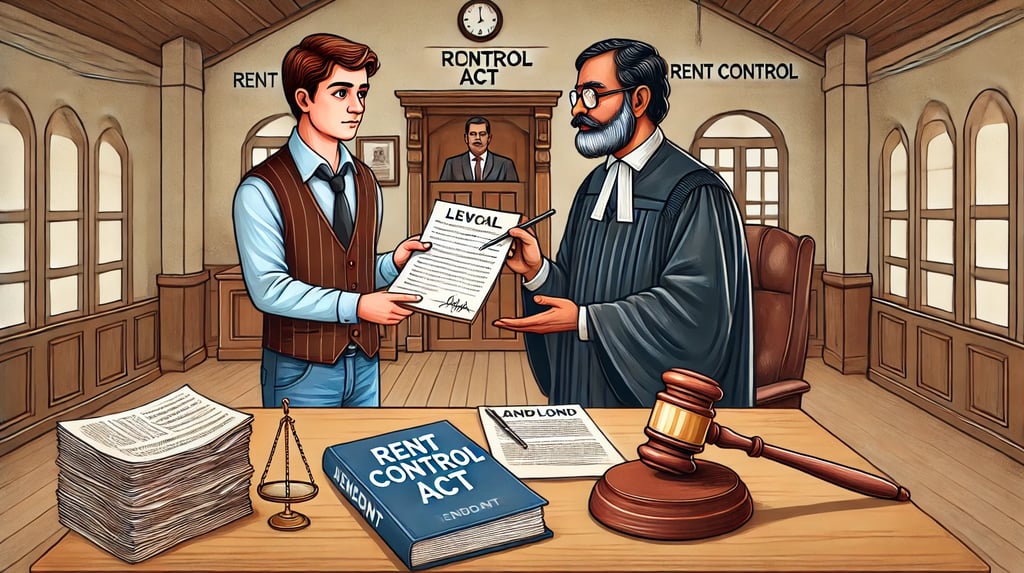Can a tenant defend eviction by the landlord
Learn how tenants in India can legally challenge eviction. Know your rights, legal defenses, and the eviction process to protect your tenancy.
Archita
3/9/20253 min read


"A house is much more than a mere shelter, it should lift us emotionally and spiritually."
In India, tenant evictions are governed by state-specific Rent Control Acts and central laws like the Transfer of Property Act, 1882. While landlords have the right to evict tenants under certain conditions, tenants are also protected by legal safeguards. Understanding these laws, procedural requirements, and defenses is critical for renters facing displacement. This India-specific guide explains how tenants can challenge eviction, the legal process, and key rights to protect their tenancy.
Valid Grounds for Eviction Under Indian Law
Indian landlords can evict tenants only for legally recognized reasons, which vary slightly by state but generally include:
Non-payment of Rent: Persistent default despite reminders (as per terms in the rental agreement).
Breach of Lease Terms: Subletting without consent, unauthorized use, or property damage.
Owner’s Personal Use: Landlords may reclaim property for self or family occupation (requires proof of bona fide need).
Property Renovation/Demolition: Requires government approval and valid intent.
Illegal Activities: Using the premises for unlawful purposes.
A few key points must be kept in mind though, State Rent Control Acts (e.g., Maharashtra Rent Control Act, Delhi Rent Control Act) outline specific grounds. Another one could be that Landlords must issue a formal eviction notice and file a case in the Rent Court/Civil Court.
Legal Defenses Against Eviction in India
Tenants can challenge eviction by proving the landlord’s claims are invalid or procedural lapses exist:
Common Defenses:
Improper Notice: Eviction notices must comply with Section 106 of the Transfer of Property Act (minimum 30-day written notice for month-to-month tenancy).
No Bona Fide Requirement for Personal Use: Tenants can demand proof of the landlord’s genuine need.
Retaliatory Eviction: If eviction follows tenant complaints about repairs or safety issues.
Discrimination: Eviction based on caste, religion, or gender violates Article 15 of the Indian Constitution.
Rent Control Protections: In states with Rent Control Acts, tenants paying below-market rent enjoy stronger occupancy rights.
A few key points to understand the legal standpoint a little better. Now tenants can file counter-affidavits in court to present evidence. Another thing to be kept in mind is delays in court proceedings often work in the tenant’s favor, allowing time to negotiate.
The Eviction Process in India
Evictions in India follow a structured legal procedure:
Notice to Quit: Landlords must serve a written 30–60 day notice (varies by state and lease type).
Filing an Eviction Suit: If the tenant refuses to vacate, landlords file a case in the Rent Court or Civil Court.
Court Proceedings: Both parties present evidence; the court examines lease terms, rent receipts, and compliance with laws.
Execution of Order: If the court rules for eviction, local authorities enforce it (no self-help evictions allowed).
Tenant Rights During the Process:
Right to receive a valid notice.
Right to contest the eviction in court.
Protection against harassment (e.g., cutting utilities, changing locks).
How Tenants Can Prepare to Challenge Eviction
To strengthen their defense, tenants should:
Actionable Steps:
Document Everything: Save rent receipts, communication with the landlord, and photos of property damage/repair requests.
Verify Lease Terms: Ensure the landlord’s claims align with the rental agreement.
File a Counterclaim: Argue against bona fide needs or procedural errors (e.g., improper notice).
Seek Legal Aid: Approach District Legal Services Authority (DLSA) or NGOs for free legal support.
Negotiate: Propose a settlement, such as clearing dues or vacating with extended time.
Again, Just a few things should be kept in mind though, courts often favor tenants if landlords fail to follow due process, additionally, stay informed about state-specific timelines and procedures.
Conclusion
Tenants in India can effectively defend against eviction by leveraging legal protections under Rent Control Acts, challenging procedural flaws, and proving the landlord’s claims are unjustified. Timely legal action, thorough documentation, and awareness of state laws are crucial to safeguarding tenancy rights. Always consult a lawyer to navigate complex cases and explore out-of-court solutions.
Understanding your rights is the first step to protecting your home. Tenants who stay informed and act within the law can challenge unfair evictions and secure their place with confidence.
FAQs:
Can a landlord evict me without notice in India?
No. A written 30–60 day notice (depending on lease type) is mandatory under Section 106 of the Transfer of Property Act.What if I correct the breach (e.g., pay rent) after the eviction notice?
In some cases, courts may dismiss the eviction if the tenant remedies the issue before the hearing.How long does an eviction case take in India?
It varies, but cases often take 6 months to 2+ years due to judicial backlog, giving tenants time to prepare.Can I be evicted during the monsoons or COVID-19?
Some states impose temporary bans on evictions during harsh weather or emergencies, but no nationwide rule exists.Are verbal eviction notices valid?
No. Only written notices complying with legal requirements are enforceable.
Housing India
Your source for housing insights in India.
© 2025. All rights reserved.
